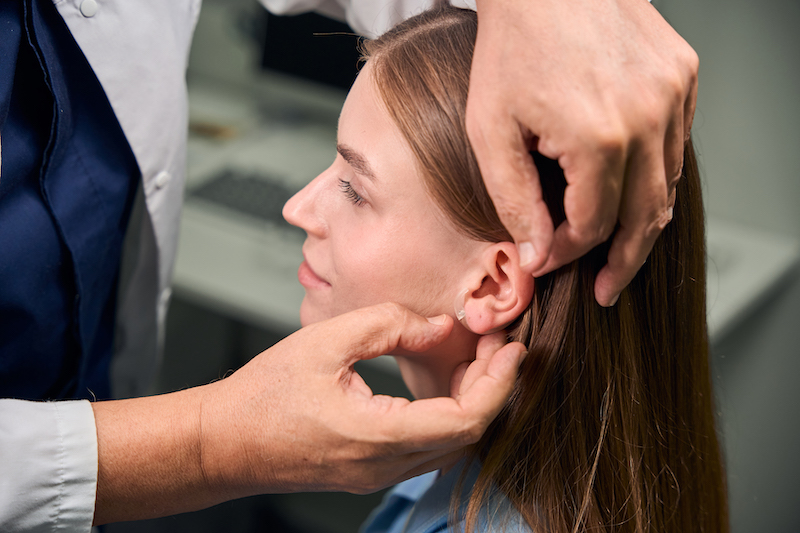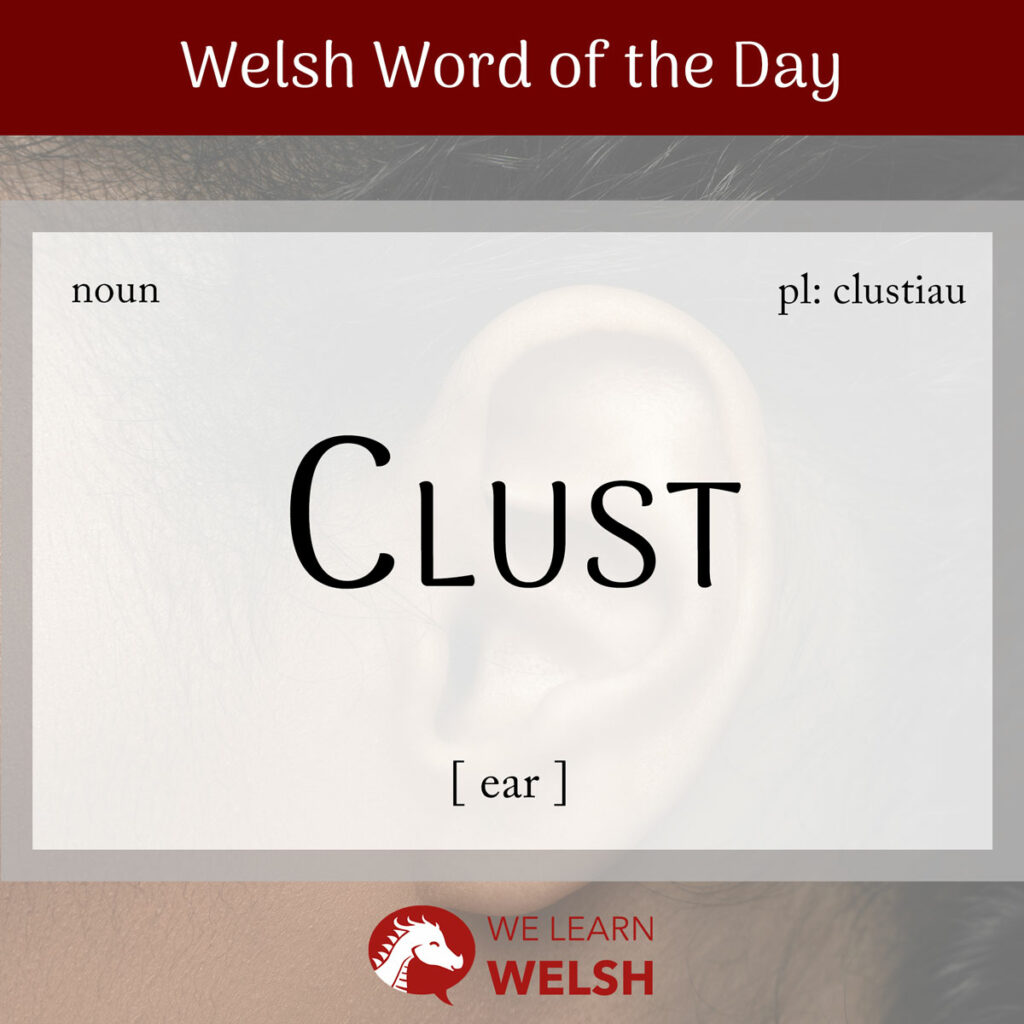Do you know your body parts in Welsh? If not, today’s post will be a step in the right direction, because we’re talking about clustiau (ears). The singular, and our word of the day, is clust (an ear).
clust
ear
clustiau
ears
Clust is a feminine noun which originates from the proto-Celtic *klousta, also referring to an ear, or more abstractly, to the faculty of hearing. Interestingly, it’s not the only word for ear that has existed in Welsh. Historically people used the word ysgyfarn, which is also the root of ysgyfarnog (hare) – literally meaning ear-y!
Another ear-y word in Welsh that you might not expect comes from clust itself. This is clustog, meaning pillow. You could think of it as a resting place for your clustiau.
Here is how clust mutates:
Soft mutation
glust
Nasal mutation
nghlust
Aspirate mutation
chlust
This word is also sometimes used to mean tongue, though not the tongue you have in your ceg (mouth) – that’s a tafod. But clust is used instead of tafod to refer to the tongue of an esgid (shoe). Interestingly, many also use it to refer to the handle of a cwpan (cup).
The word ear has a second meaning in English, too, referring to an ear of corn. We don’t use clust for this in Welsh; it has its own word, which is tywysen.
Ro’n i’n cochi at fy nghlustiau.
I was blushing up to my ears.
The clust is an organ (organ) that we use to clywed (hear) and gwrando ar (listen to) various kinds of sŵn (sound). It’s also often decorated with clustdlysau (earrings).
It consists of three main parts. These are y glust allanol (the outer ear), y glust ganol (the middle ear), and y glust fewnol (the inner ear). Notice two kinds of mutations go on in these phrases – a soft mutation to clust itself, becoming glust, and a soft mutation to the descriptor adjective. This is because clust, as a feminine noun, soft mutates after y (the) and also causes soft mutations to adjectives.
Do‘n i’m yn gallu credu fy nghlustiau pan glywais y newyddion!
I couldn’t believe my ears when I heard the news!
Within these bigger structures, there are many different small organs that make up the structure of the clust:
- godre’r glust = the auricle
- corn y glust = the ear canal
- y dympan / pilen y glust = the eardrum
- esgyrnynnau’r glust / clust-osiglau = the ossicles
- y cyntedd = the vestibule
- cogwrn y glust = the cochlea
- y llabed clust = the earlobe
Did you know that esgyrnynnau’r glust are the smallest esgyrn (bones) in the whole body?
Mae gan fy nghi glustiau mawr llipa.
My dog has big floppy ears.
In such a complex and delicate part of the corff (body), things are bound to go wrong. Many people experience colli clyw (hearing loss), especially with age, requiring cymhorthion clywed (hearing aids). Another common condition is toriad (perforation) of y dympan.
If you are experiencing poen clust / pigyn clust (earache) or think you might have a haint ar y glust (ear infection), you may need to see a meddyg y clyw (ear specialist, literally hearing doctor). Most meddygon y clyw work more broadly in otorinolaryngoleg (otorhinolaryngology). This mouthful of a medical profession is the study of the clust (ear), trwyn (nose) and gwddf (throat).
You know the English expression about being head over heels in love? Well, in Welsh this saying is a little more clywedol (auditory). We describe this as being dros eich pen a’ch clustiau (over one’s head and ears) instead.
Roeddwn i dros fy mhen a’m clustiau mewn cariad.
I was head over heels in love.
Instead of having a word in someone’s ear, we say we are chwythu yng nghlust rhywun (breathing in someone’s ear). Or you could say you are clust yng nghlust (ear in ear) with someone, which means you’re whispering together and sharing secrets or gossip.
Another fun one is mae clustiau mawr gan foch bach. This literally means little pigs have big ears and conveys the sentiment that children hear everything. A possible variant is mae clustiau hirion gan foch bach.
Dw i eisiau tyllu fy nghlustiau er mwyn cael gwisgo clustlysau.
I want to pierce my ears so I can wear earrings.
Most English expressions about clustiau work well in Welsh too. For example, you can say cael clust rhywun (gaining someone’s ear) to mean you got someone’s attention and were able to speak your mind to them, or suggest mae ganddo glust fain (he has a sharp ear) to show that a person has good hearing.
Welsh people are also clustiau i gyd (all ears) when they hear something interesting, complain about being hyd at fy nghlustiau mewn gwaith (up to my ears in work), and wisely warn that mae gan gloddiau glustiau (walls have ears).
Thanks for rhoi clust i mi (listening, literally giving me an ear) – I hope it wasn’t i mewn drwy un glust ac allan drwy’r llall (in one ear and out the other)!


